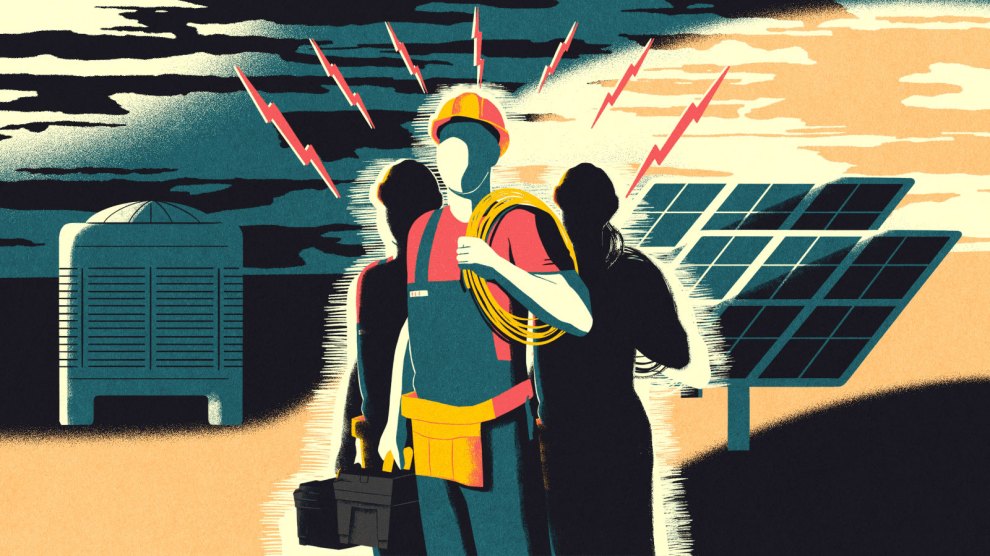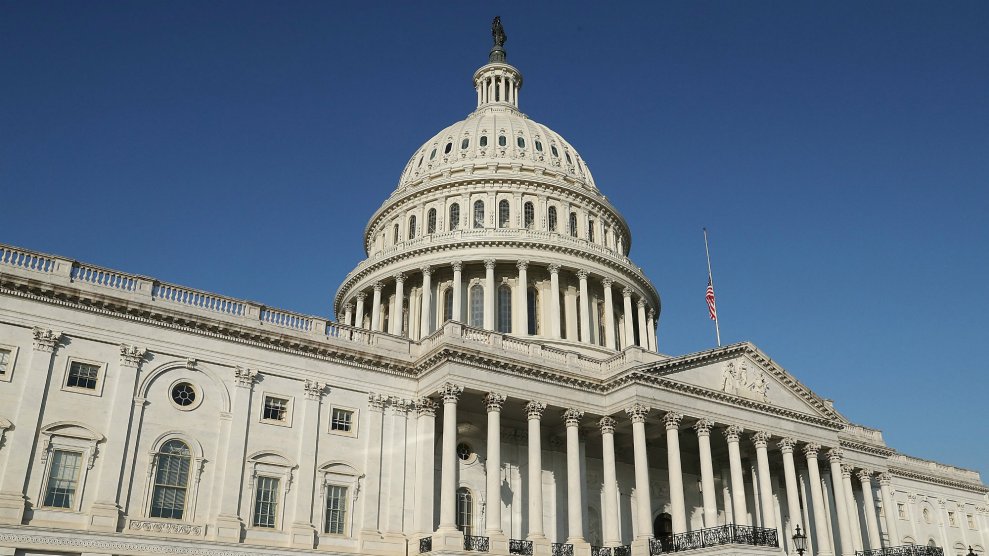
Massachusetts Governor Maura Healey, left, at a press conference with cabinet members including Melissa Hoffer, right, the state's first climate chief. Craig F. Walker/The Boston Globe/Getty
This story was originally published by the Inside Climate News and is reproduced here as part of the Climate Desk collaboration.
Writing clean energy policies and implementing them is hard. It takes experts. Those people serve on task forces, stay up late writing policy briefs and fret over the details.
In an era when many states are making rapid progress to reduce emissions, the experts are working harder than ever—and they’re tired.
Autumn Proudlove, associate director of the NC Clean Energy Technology Center at North Carolina State University, has heard others refer to this as “stakeholder fatigue.” She wonders if the overwork of subject-matter experts may limit how much states can accomplish on clean energy policy. “There are just so many stakeholder processes, so many proceedings going on that these organizations that intervene and advocate are running out of time and resources,” she said.
The term “stakeholder” can mean anyone who stands to be affected by a policy. A stakeholder meeting may include environmental groups, consumer advocates, clean energy business leaders and utilities, among others. And there also are the legislators and agency staff who go to many of the same meetings and may feel the same fatigue.
The NC Clean Energy Technology Center last week issued a report tracking decarbonization policies in the states in the first quarter. This is the first in a new series of quarterly reports, so there is no previous one to compare it to. But Proudlove, who has monitored state clean energy policies for years, observed that the number of actions in the states accelerated to a rapid pace in the last year or two, and now the pace seems to be leveling off.
“Part of why we’ve seen it start to level out is that you only have so much time to consider bills,” she said. “There’s only so much that stakeholders can be actively engaged in, so you start to reach a point where you’ve got to prioritize what you’re working on and you reach a limit just based on time and capacity.”
The report lists Massachusetts as the state that had the most decarbonization policy actions in the first quarter, followed by California, Minnesota, New York, and Hawaii, so I thought that would be a good place to see how the experts are feeling.
“Many groups and experts that should be [part of] the process are stretched to the limit in terms of bandwidth,” said Bradley Campbell, president of the Conservation Law Foundation, a Boston-based environmental advocacy group that works throughout New England. “It’s especially a concern in terms of community-facing environmental justice groups that typically don’t have the capacity to devote a lot of resources to regulatory and adjudicatory proceedings. It’s an enormous challenge and I think it’s only going to get worse as decarbonization becomes more urgent.”
Part of the solution is for groups to hire and train more people, which his group is doing. Another way to help is for states to get smarter about the process. That might mean doing fewer special commissions and other proceedings that involve lots of meetings and filings but may not translate into actions.
“There’s always a concern that process can be the enemy of progress,” Campbell said. “Launching into a stakeholder process is sometimes just a way of avoiding hard decisions.”
Clean energy policy in Massachusetts was held up for eight years because Gov. Charlie Baker, a Republican, often didn’t want to go as far as the Democrats who controlled the legislature, he said.
Now, Gov. Maura Healey, a Democrat, has taken the place of the term-limited Baker, and Democrats are trying to make up for lost time with an unusually eventful few months of activity. On her first full day in office, Healey signed an executive order creating the position of “climate chief” and a state Office of Climate Innovation and Resilience.
Lawmakers are working on proposals that would accelerate the state’s shift to 100 percent carbon-free electricity and reduce emissions in other parts of the economy. It’s not clear what is likely to pass this year.
In North Carolina, clean energy experts are facing a different kind of fatigue. Instead of helping to facilitate rapid progress, they are fighting against a Republican-controlled legislature that seeks to undermine the policies of Gov. Roy Cooper.
“It just demoralizes the governor, his staff and his executive agencies from taking action,” said Mary Maclean Asbill, director of the North Carolina office of the Southern Environmental Law Center. “So we find ourselves intervening in everything, pushing, trying to get media attention, intervening in every utilities commission docket, lobbying at the General Assembly—everything we can do to try and hang on to the hope that North Carolina will decarbonize.”
She wishes she were in a situation like in states where the governor and the legislature agree on a path forward for clean energy, even if it would be exhausting. “I think that we would just have to rise to the occasion and would welcome it,” she said. “I mean, the time to act is now. I’m not going to say we would work around the clock, but we would work as mightily as we could.”
Campbell and Asbill each said the federal Inflation Reduction Act is leading to a big increase in the needs for clean energy expertise at the state level. The law is bringing money for programs, and states need to figure out what to do with it.
This is a good problem to have. But it also leads to the possibility of fumbling on implementation. “The need to get past the endless process and regulatory foot-dragging is especially urgent now,” Campbell said.
















